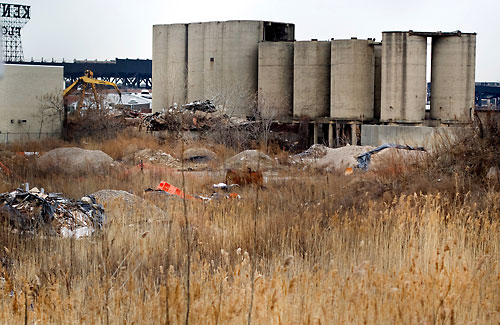Maybe they should call it Half Foods.
The supermarket giant Whole Foods has revealed that it cannot develop its toxic, Gowanus Canal zone site by itself and must now call in an outside developer to finish the stalled project.
The announcement led to concerns that the long-stalled project, at Third Avenue and Third Street at the western end of Park Slope, would expand into a larger shopping center.
“They might want to make this into a bigger project,” said Ken Fisher, a land-use lawyer and former councilman from Brooklyn Heights.
Such a project would be unlikely to include residential units, as the land is currently zoned for manufacturing and commercial use only — and securing a rezoning would be a multi-year effort.
Given the increased residential development on Fourth Avenue nearby, it’s fair to conclude that Whole Foods and its hand-picked development partner will fill out the site with more retail.
“It would have to be rezoned [from manufacturing to residential use] and the time and cost associated with that just seems too high right now,” said one Gowanus-area developer who did not want to be named.
The speculation began last week when a City Council source told The Brooklyn Paper and several local Web sites that Whole Foods said it would no longer build its first Brooklyn location at the Gowanus site.
The rumor made some sense, given a summertime announcement by Whole Foods corporate bigwigs that the chain would reduce its planned new stores nationwide because of slumping revenue.
In addition, Whole Foods encountered a toxic plume of benzene and other pollutants at its Gowanus site that has delayed progress.
But further investigation by this newspaper revealed that just the scope of the project had changed, not the retailer’s desire to be in Brooklyn.
“We have now concluded that the optimal path for project will be for Whole Foods Market to partner with a developer on the store’s construction,” a company official, Mark Mobley, wrote to Councilman Bill DeBlasio (D–Park Slope) last week.
“We remain wholly committed to bringing Whole Foods Market to Brooklyn,” the memo added.
Still, the note to DeBlasio raised as many questions as it answered, because it did not spell out the still-unnamed developer’s role.
Chris Havens, a commercial broker who is unaffiliated with the project, said Whole Foods was probably planning to hire a firm to construct its building and then become the long-term tenant.
“To get a loan, you need an enormous amount of cash,” Havens told The Brooklyn Paper. “It’s not worth it to them to put cash in the building.”

























